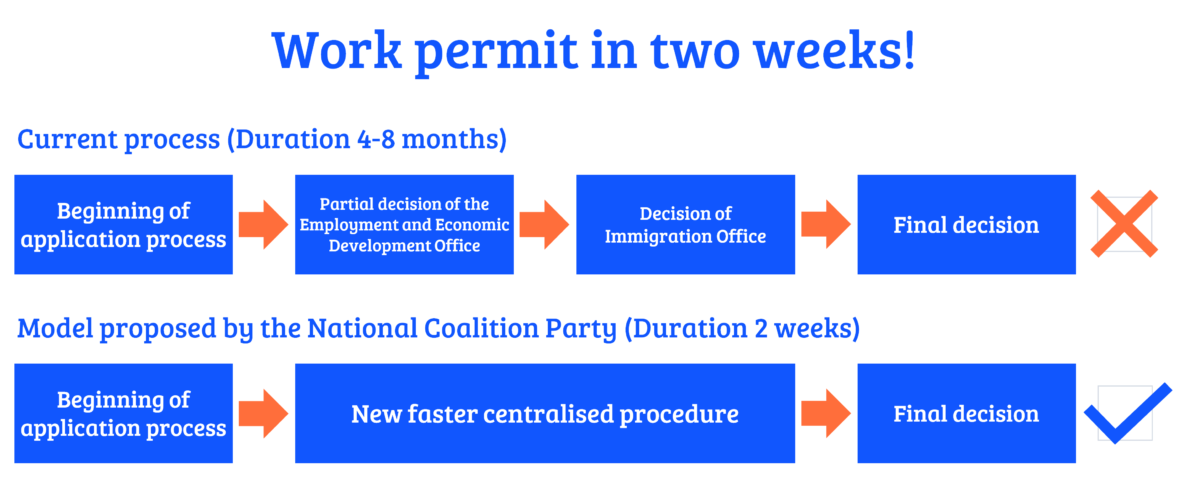
The National Coalition Party’s strategy to increase international recruitment – It’s time to bring skilled workers to Finland!
Julkaistu:
Why does Finland need more workers?
Finland’s working-age population is on the decline while at the same time the number of older people is increasing. This situation poses a threat to the foundations of our wellbeing. The shrinking working-age population must be able to support the wellbeing of a growing number of pensioners. Therefore, we need more working-age employees in Finland in order to maintain the services of our welfare society in a sustainable way and to keep workers’ taxes at a reasonable level.
There is global demand for Finnish products, but due to a lack of workers, we are not able to meet those needs. There are more jobs than workers, which leads to a loss of profit. Even though the economic crisis caused by the coronavirus has increased labour supply in some sectors, the lack of a skilled workers remains a problem for many companies.
At worst, the lack of skilled workers hinders business growth and new investments. Tens of thousands of highly educated people who would not have seen Finland as an option year ago now present a potential target group for marketing and measures.
The shrinking workforce reduces investments in Finland. Countries where the workforce is growing are a more attractive option for building production plants. According to experts, more investments are directed at Sweden than Finland, for example.
Decreased birth rates require careful analysis and a response. However, changes in birth rates are not visible on the labour market until decades later. We need a rapid response to the acute problem of labour shortages which is why we should focus on international recruitment and attracting more skilled foreign employees to Finland.
There is fierce global competition for both top performers and executive level professionals. International recruitment is not about charity, and working in Finland must be profitable and attractive to foreign employees themselves, their families, employers and society at large. It should be easy to come to Finland and take up jobs that are beneficial to everyone.
Creating smooth pathway to jobs in Finland; Five concrete solutions
1) Two-week work permit process for certified companies
- Successful companies need to be able to get the workforce they need to Finland quickly.
- The National Coalition Party proposes a swift two-week work permit process for certified companies. All companies that undertake strict self-monitoring procedures and report back to the competent authorities can apply for a certificate.
- Work permits can be issued faster when the focus is shifted to retrospective supervision. This would not affect the safety and background checks of employees. Violations could be subject to substantial sanctions.
2) Adequate resources for processing work permits and process automation
- Automation can speed up the processing of work permits.
- The government needs to update the legislation urgently so that the competent authorities can automate some of the regulatory processes.
- Systems should be able to retrieve and combine data from different databases automatically.
- The Finnish Immigration Service needs more resources as emergency assistance for processing work permits.
3) An opportunity for companies to support employees in applying for a work permit
- Application processes are often prolonged due to deficiencies in applications. The application process should be as clear as possible to minimise potential errors.
- In the electronic application process, employers should be able to pre-fill and check applications with the applicant’s permission. This would allow employers to speed up the recruitment process.
4) From availability consideration to effective follow-up processes
- Labour availability consideration takes away resources from both Employment and Economic Development Offices (TE Offices) and companies that have to prove that there is a lack of available employees. In addition, different parts of the work permit system display differing interpretations regarding the availability consideration obligation.
- The time spent on availability is time taken away from the processing of other applications.
- Availability consideration should be stopped and the focus shifted to effective follow-up procedures. Automation and data from the income register could be used in the follow-up phase. The monitoring of working conditions could be made more effective by increasing the resources and powers allocated to labour protection and the police.
5) Centralisation of responsibility in new international recruitment agency
- The work permit process, decentralised under three ministries, should be centralised into a new international recruitment agency.
- All persons handling work and residence permits would thus be working under the same management.
- Responsibility for results and resources should be centralised.
Three most important bottlenecks regarding the availability of skilled labour
1) Incorporating workers from abroad into the public sector
- In addition to the private sector, the public sector, and in particular the health sector, will need more professionals in the coming years. These needs cannot be met without international recruitment.
- We cannot compromise on professional or language qualifications in the care sector. However, we can improve language training and streamline qualification procedures.
- The National Coalition Party proposes a series of measures, including agreements and pilot experiments with key countries of origin of the foreign workforce in Finland (Philippines, Ukraine), where workers could start learning Finnish and acquiring the required professional qualifications before their arrival in Finland. We need to build a clear qualification path for foreign nurses.
2) International students in the Finnish labour market
- At present, there are over 20,000 foreign degree students studying at Finnish universities. We must be able to persuade more of them to stay and work in Finland after they graduate.
- The National Coalition Party proposes, for example, that permanent residence permits be offered to foreign student who graduate from Finnish universities. We also propose a model by which students from outside the EU/EEA area can deduct their tuition fees for tax purposes if they stay and work in Finland;
3) Finland’s strengths must be marketed actively
- International competition for skilled labour is fierce. In Finland, we have good opportunities for competing and attracting employees. However, we have to active in communicating our strengths.
- The National Coalition Party proposes, for example, a marketing program about Finland as a training and workplace for foreigners and Finns abroad. Key services must also be available in English and, in addition to foreign workers, their spouses and families must be taken more into consideration.




